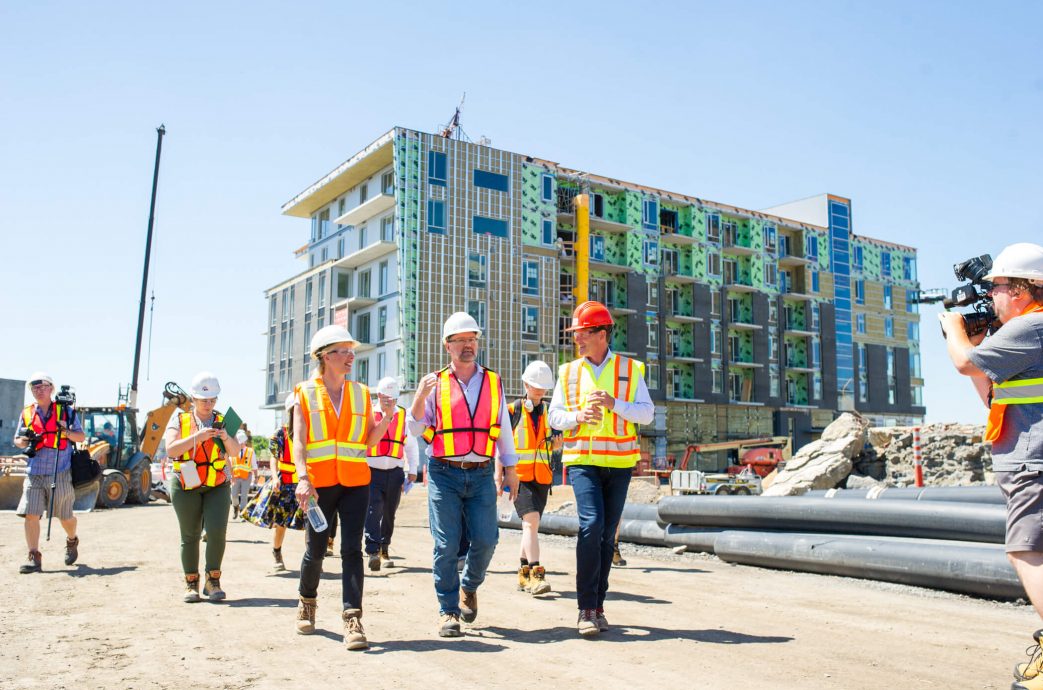By ELIZABETH PAYNE, OTTAWA CITIZEN – Published on: May 21, 2015
Algonquin construction workers and tradesmen will play a key role in the redevelopment of the former Domtar site on the Ottawa River as part of what is being called a historic collaboration between the Algonquin-Anishinabe Nation and private industry in Ottawa.
The Algonquin presence in the community being called Zibi, the Algonquin word for river, will extend beyond helping to build it, said Jeff Westeinde, founding partner of Windmill Development Group, the lead developer on the project.
Westeinde said there will be a quota on-site for Algonquin construction workers. There will also be mentorships and apprenticeships, and opportunities for Algonquin-run businesses.
Westeinde said one idea is to have an Algonquin “embassy” in the community, which would become home to aboriginal organizations from across the country for offices and to showcase “what is going on with First Nations across the country.”
“We don’t just want Algonquins working on construction and when it is over they move on,” said Westeinde. “Our intention is to have a working relationship with the Algonquin nation.”
Windmill has been criticized by some for using an Algonquin word — Zibi — for the $1.2-billion residential, retail and commercial community on the 37-acre former industrial site that includes a parcel on the Quebec side of the river, as well as the Albert and Chaudière islands.
Like much of Ontario and Quebec, the land is on unceded Algonquin territory. Windmill also faces several Ontario Municipal Board challenges, including one from renowned architect Douglas Cardinal, who argues the land should not be used for private development but should be turned over for public use, with a focus on indigenous community and culture.
Members of an Algonquin advisory committee working with Windmill on the project have said that critics do not speak for the Algonquin community.
Wanda Thusky, a member of that advisory committee and co-owner of a construction business based in Kitigan Zibi, said the relationship between Windmill and Algonquin communities should bring difficult-to-find jobs for Algonquin tradespeople and others.
“Just the fact that Windmill has extended its hand to our nation and to our tradesmen, that is something that is unique.”
For tradespeople and construction workers from Kitigan Zibi, it has been almost impossible to work off reserve because of complex Quebec construction regulations. Windmill is negotiating to have parts of its site declared a special administrative zone. That would allow Algonquin tradespeople to work there. Historically, many people from Kitigan Zibi have gone to the United States to work in construction because they were unable to find work near home.
“We are setting the stage for something really historical here, and I am proud to be a part of it because this is about moving forward beyond the reserve,” Thusky said.
Brenda Odjick, who chairs the Algonquin-Anishinabe advisory committee, said the partnership is unique.
“Windmill has extended a hand in friendship to the Algonquin-Anishinabe people. Never before has a private developer been as inclusive and collaborative in this part of Canada, and as consistent with the Algonquin values attached to the environment and to the community,” she said.
Windmill has also signed a letter of intent with the Algonquin community of Pikwàkanagàn, near Golden Lake, which covers employment and training on the site as well as investment opportunities for members of the Algonquin community once parts of the development are completed.
The development company hopes to sign letters of intent with other Algonquin communities, including in Kitigan Zibi, near Maniwaki, as well as with other groups representing the Algonquin nation.
In addition, the site will include tri-lingual signs — in English, French and Algonquin — plus art, landscaping and culture that represent the Algonquin nation.
The City of Ottawa has been working with Kitigan Zibi to incorporate Algonquin art and culture into the LRT transit station at LeBreton Flats.
Westeinde said he hopes LeBreton, Zibi and, eventually, Victoria Island will become centres that recognize First Nations history, culture and language in Canada’s capital.
Thusky emphasized she did not speak for her community, Kitigan Zibi, or other Algonquin communities, but said she hopes the collaboration with Windmill can be the beginning of a reset in First Nations and non-First Nations relations in the Ottawa area.
“Rather than being confrontation all the time, our hope is we can change history. We want to write a new chapter and we want to be pioneers in this model.”
•••
Windmill will announce Thursday that Zibi has been named a “One Planet Community,” one of only 10 in the world to receive the designation, which incorporates environmental sustainability as well as social and economic sustainability. The project’s engagement with the Algonquin community is a large part of that designation.
Pooran Desai, international director of the One Planet Communities Program with the charity Bioregional, said he hopes Zibi will become a flagship for the concept and encourage others to create similar initiatives in their communities.
Zibi will be a zero carbon community, include reduced water use and waste creation, will have easily accessible care and bike-sharing services, and will include “a whole series of things to improve the quality of life,” said Westeinde. Among early possible tenants are the Ottawa caterer Thyme and Again which, Westeinde said, has signed a letter of intent to open a community kitchen on the site, Ottawa brewer Kichesippi Beer, and an Australian urban farming company called Rebel Farms.









